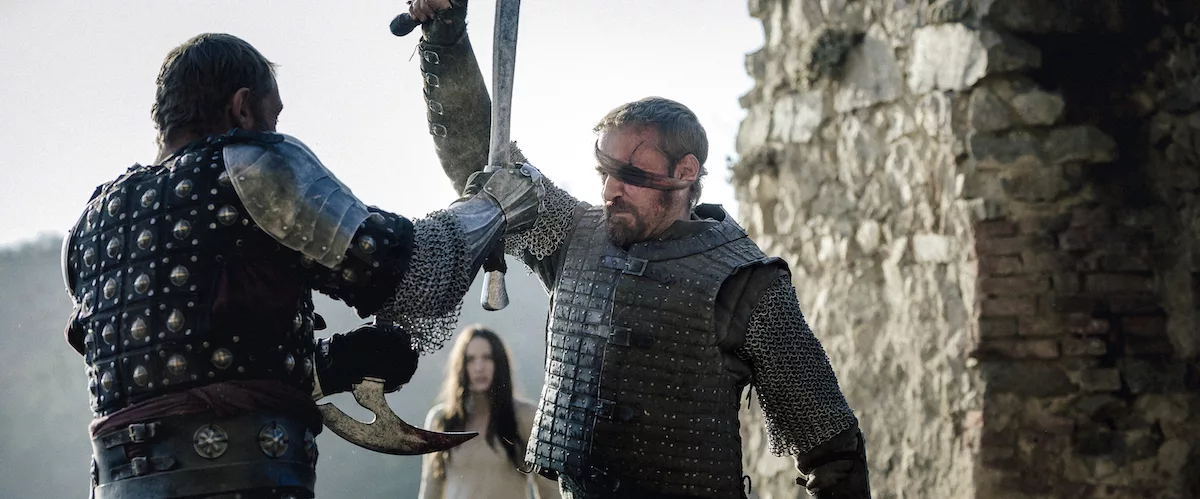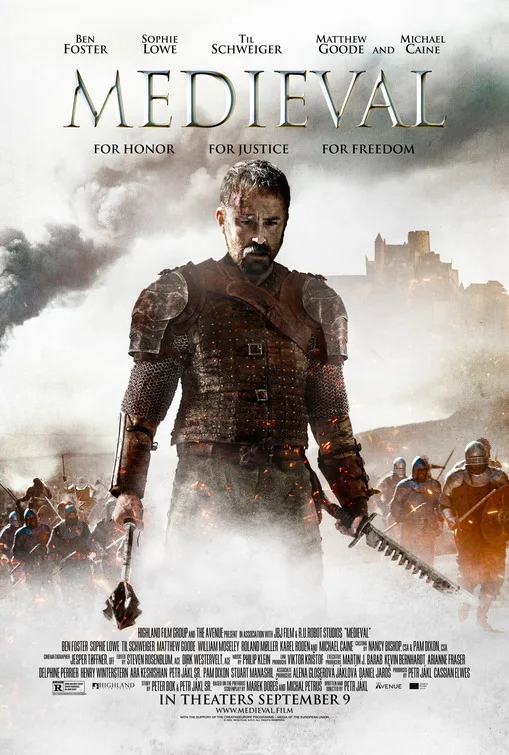It takes a moment, but soon it becomes clear why the somber Czech period epic “Medieval” doesn’t work as a dour post-“Game of Thrones” costume drama. Instead, “Medieval” is a bleak and visually oversaturated allegory about the 15th century revolutionary Czech soldier turned military leader Jan Žižka (Ben Foster). There’s blood and chainmail, yes, but it’s also a self-serious allegory about duty and faith during miserable times.
“Medieval” features the same kind of brutal violence, convoluted soap opera plotting, and sad sack fatalism that defines so much of “Game of Thrones.” But unlike HBO’s sensational and uneven adaptation of George R.R. Martin’s engrossing fantasy novels, “Medieval” presents the past as a bloody, un-romantic parable whose punishing style is explained by its story’s concluding moral. Somehow, Žižka, a stoic man of action, meets any challenge and also combats the same spiritual decline and systemic inequity that eventually led to his real-life reputation as a battlefield legend and a beloved man of the people. I say “somehow” because “Medieval” doesn’t make such a convincing case for Žižka as a saint-like iconoclast.
“Medieval” begins with a lot of expository dialogue and a couple of bone-crunching, but otherwise flat action scenes. This crash course in Czech history is often compelling for its intricate details, but rarely for its characterizations, dialogue, or dramatic tension. It does, however, feature Michael Caine as Lord Boresh, a surly imperial adviser who, for a few scenes, grumbles magisterially and also helps set up the movie’s plot.
Speaking of the plot: after an overly complicated series of double crosses and secret allegiances, the sour-faced Žižka finds himself caught in a feud between the well-liked, but powerless Bohemian King Wenceslas (Karel Roden) and his conniving brother Sigismund (Matthew Goode). Žižka and his men are charged with abducting Lady Katherine (Sophie Lowe), the independent-minded fiancé of Lord Rosenberg (Til Schweiger), one of Sigismund’s allies. Žižka and Katherine instantly hit it off, though it’s never really clear why based on their halting conversations about God, or Foster and Lowe’s general lack of chemistry.
Unfortunately, “Medieval” does not improve after Žižka takes it upon himself to protect Katherine from Sigismund, who wants to unseat his brother, and is also willing to betray his pal Rosenberg in order to do it. There’s some impressive antagonistic chemistry between Foster and Roland Møller, the latter of whom plays Torak, Sigismund’s main heavy.
There’s also some appropriately upsetting battle scenes, all of which are either over-exposed or hyper-stylized to the point of distraction, and sometimes filmed with surreal and way too physically proximate hand-held camerawork, all of which approximates a sort of you-are-there derangement. Various body parts are smashed to bits, soldiers are knocked off their horses, and metal grinds against metal. The stuntwork and period weapons in these scenes all look fine, and some of the special effects and image-compositing look costly enough. But the real MVPs of “Medieval” are the foley artists and sound designers who made every metallic scrape and fleshy squelch seem more exciting than whatever’s shown on-screen.
There’s a heavy-osity in even these propulsive beat-’em-up sword-fights that creeps in from earlier dialogue scenes, which tend to drag on and look like somebody accidentally picked all the wrong settings on their new high-definition television. Too bad that, in conversation, Foster’s Žižka doesn’t get to say much that makes him seem like a game-changing leader. He tells his men that if they choose to fight with him, it would be for a “good cause” and “that’s a good death.” They respond by singing about being “God’s soldiers,” which seems presumptuous, but ok.
In theory, Žižka and Katherine’s conversations are both novel and interesting since they inevitably concern God. Žižka, being a perpetually frustrated soldier, sometimes mumbles about “God’s will” and how “death brings life,” so it’s nice to see Katherine tentatively ask him to unpack his mantra-like catechisms. After all, “Medieval” concludes with a choral hymn whose lyrics translate to “Pray to God and have faith in Him,” and somebody’s got to pave the way for that lofty foregone conclusion.
It’s also kind of a shame that Lady Katherine talks like she’s trying out for a bad religious play. She asks Žižka about his late wife, and he tells her that he never had to question that foundational relationship. “Those feelings may be the only things you know that’s true,” Katherine responds. “If there’s one thing that was given to us by God, maybe that’s all we’re given.” I’d agree if anything in “Medieval” had a similarly inspiring effect. Jarring action and sudsy twists, sure, but God, duty, and romantic love? Those finer feelings demand a lot more than trendy pessimism and formulaic brutality.
Now playing in theaters.




















